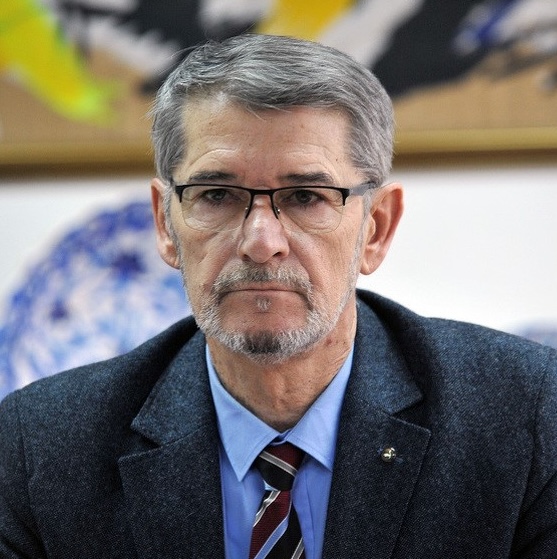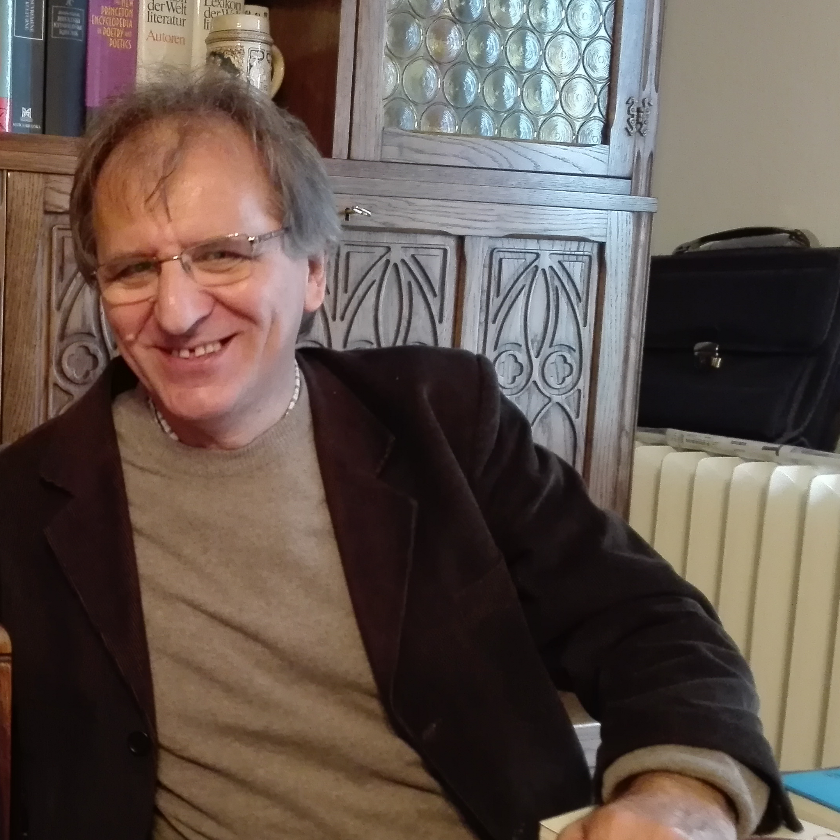Organizer: prof. Ewa Szperlik (ewaszper@amu.edu.pl)

Prof. Kodrić will give a lecture entitled: “East and West – heart and mind” Interculturality and cultural memory in modern literature, culture and society of Bosnia and Herzegovina. The modern literature of B&H begins after the Austro-Hungarian occupation of B&H in 1878, when the overall Bosnian-Herzegovinian culture began to develop in accordance with the Western-European cultural and social context, after more than four centuries of literary and cultural practices related to the context of the Ottoman empire and Oriental-Islamic culture. This crucially determines the character of the modern literature of B&H, which becomes a literature between the East and the West, whereby the East, especially the Muslim Orient, is a space of nostalgic memory, and the European West is a rationally perceived space of real life. The same also characterizes the overall modern culture of B&H and its cultural memory from the end of the 19th century until today, with significant repercussions on the entire Bosnian-Herzegovinian society, including identity and wider social politics, especially in terms of understanding relation of B&H and Europe.

To the scientific methodology used by prof. Kodric will be referred to by a lecture by Prof. Dr. Vanda Babić Galić entitled: Interliterariness, cultural memory and literary identity (With the example of Boka kotorska literature). The cultural and literary heritage of Boka kotorska, as a Mediterranean region of Montenegro, is a hotbed of interliterariness and interculturality, where we find writers and works originally related to different literary and cultural traditions. In the literary-historical and cultural-poetic context, it belongs to the Mediterranean area, the Croatian literary heritage as well as the literature of Montenegro. However, Bokel’s literature in itself implies Bokel as the bearer of Boka’s culture, and this fact is not negligible. It is the name which will, on the basis of the theory of cultural memory history of literature and its macro-models, lead to new insights and a picture of the literary culture of Boka. The cultural memory history of literature represents an innovative methodological system that emerged from cultural memory studies, semiotics and post-structuralist “new” literary histories, which is based on the problem of the representation of the past and the intertextual relations of literature, and whose goal is a comprehensive understanding of the development processes and phenomena of literary history in a cultural manner. The theory was initiated and originally developed by Sanjin Kodrić and his approach to understanding phenomenon of Bosniak literature and culture, which is used here as a methodological starting point do understand phenomenon of Boka kotorska literature and culture.
Prof. Dr. Vanda Babić Galić is a full professor in the field of Croatian literature and a scientific advisor at the Institute for Migration and Nationalities in Zagreb, as well as a special advisor to the Minister of Foreign and European Affairs of the Republic of Croatia. She especially deals with older Croatian literature, particularly Croatian literature of Boka Kotor, and Croatian oral literature. From 1992 to 2023, she worked at the University of Zadar, at the Department of Croatian and Slavic Studies, and was also an external associate at the Department of Culture and Tourism. She has realized numerous projects of various kinds, and is a member of the Society of Croatian Writers, the Croatian Society of Writers, Matrix Croatica, the Central Administration of HKD Napredak, the Croatian Brotherhood of the Bokel Navy 809. Zagreb, the Community of Bokel Croats, the PEN Centre of Montenegro and vice-president of the Croatian Cultural Centre in Zagreb.

Jasmin Imamović, writer and MP of Bosnia and Herzegovina
The next lecture from the proposed series by Jasmin Imamovic, who is both a writer and a politician with a very prominent role in Bosnian-Herzegovinian society from the 1990s onwards, and he is currently a representative in the House of Representatives of the Parliamentary Assembly of B&H, after being the mayor of Tuzla, the second largest city in the Federation of B&H, for more than 20 years. Although at first glance it seems that his literary work and political engagement are separate, there is still a strong and important connection between them. This connection is most visible in the social aspects of Imamović’s literary work, and especially in its political connotations. The same applies particularly to his novels, among which in this sense the novel Chronicle of King Tvrtko (Ljetopis o kralju Tvrtku, 2019) has a key place as a novel with a very important role in (re)creating the cultural memory of B&H, especially in relation to the medieval Bosnian-Herzegovinian history and its importance for contemporary society of B&H and its future.

Prof. dr. Gojko Tešić, professor emeritus, University of Belgrade
The multiculturalism of the Balkans from a historical perspective in relation to the Jews living in this region and their connections with Poland will be presented during the lecture by prof. Gojko Tešić under the title Between music and poetry or telling about synthetism in the work of Stanislav Vinaver which will be devoted to the work of Stanislav Vinaver, a representative of the Serbian and Yugoslav avant-garde, author of collections of poems, pastiches and parodies the first avant-garde programmatic text in Serbian literature, Manifest expressionističke škole; journalist (collaborator of Vreme magazine and Radio Belgrade), translator of literary works from French, German, English, Spanish and Russian. Considerations will focus on the relationship between poetry and music, on the intermedial space of literature and other arts, on the area of literary threads and structures, as well as cultural and memorial discourses. The lecture will also discuss the issue of Serbian-Polish literary and cultural relations and the issue of memory and autobiography in the work of Stanislav Vinaver, who comes from a Jewish family with Polish roots.
Prof. Dr. Gojko Tešić is a retired professor, formerly associated with the Institute of Literature and Art in Belgrade and the University of Novi Sad. He is an outstanding researcher of the avant-garde, both Serbian, Russian and European. He has enormous scientific achievements (abbreviated description below), but even greater, even gigantic publishing achievements, including Polish studies. As editor of the magazine Књижевна реч (1977-1980) and editor-in-chief (1980-1984) of this important literary periodical in Yugoslavia, he broadly, competently and successively informed the Yugoslav public opinion about Polish literary life and Polish philology, subsequent generations of Serbian translators of Polish literature.

Dr. Dženana Huseinagić, soprano, Music Academy in Bijeljina (BiH)
Dženana Šehanović Sarajlić, MA, PhD candidate, Music Academy in Sarajevo, pianist
The lecture by dr. Dženana Huseinagić and Dženana Šehanović Sarajlic entitled “Sevdalinka” as a poetic-musical phenomenon in the cultural memory of Bosnia and Herzegovina is a presentation of music as a means through which cultural memory is realized. Sevdalinka is a traditional Bosnian-Herzegovinian urban love song that has stood the test of time for centuries and as such is an important and recognizable part of the cultural memory of B&H. This poetic-musical genre has a specific lyrical expression and musical form, and its origin is a kind of mixture of Slavic and Oriental-Islamic traditions and is deeply rooted in the mentality of the people of B&H. Its content refers to various events, such as ordinary love of boys and girls, regret for youth and the passing of time, love for one’s mother. As such, sevdalinka is one of the most characteristic phenomena of the folklore tradition of B&H, as well as a poetic-musical phenomenon that even today has an important place in Bosnian-Herzegovinian culture, in which it changes and is redefined in various ways in accordance with contemporary cultural trends.
Dženana Huseinagić and Dženana Šehanović Sarajljić are experts in their field. Dženana Huseinagić, graduate of music schools in Tuzla, Sarajevo and Belgrade. She obtained a PhD in media studies (2020). She is employed at the Music Academy in Bijeljina (B&H) as a professor of vocal technique. She participates in numerous music competitions and gives concerts in B&H and the countries of the Balkan. She participates in the production of music in films, conducts music workshops, and has published several dozen texts on the music of B&H. Particularly noteworthy are her efforts to preserve the musical heritage of Bosnian Muslims, i.e. Bosnians, who combine in traditional love songs, the so-called sevdalinka the tradition of eastern music and oriental emotionality with the heritage of Slavic music of the Balkan nations. Of particular importance were her performances and concerts in the London Parliament, the auditorium of the British Ministry of Foreign Affairs, as well as concerts in Birmingham, Trondheim, Stockholm and in Zagreb, Belgrade, Vienna and others. Since 2020, Dženana Huseinagić has been giving concerts with the pianist Dženana Šehanović Sarajlić, with whom they have performed numerous concerts, and jointly released an album in 2021 entitled “Sevdah i classic”, and in 2023 another album titled “Zefir”.
Dženana Šehanović Sarajlić, in 2005, almost 14-year-old Dženana Šehanović became the youngest student of the Zagreb Academy of Music in its history. She is currently preparing her doctoral dissertation at the Academy of Music in Sarajevo. She has performed in Slovenia, Serbia, Croatia, Austria, Germany, Italy, Liechtenstein, Norway, Turkey, Hungary, Pakistan, Qatar, Sweden and Great Britain. She performs classical repertoire as well as her own compositions both in solo concerts and together with renowned orchestras (Sarajevo Philharmonic, the Academy Orchestra in Zagreb, the Amoroso Chamber Orchestra (Serbia) and the Zagreb Soloists’ Orchestra.
© 2023 All Rights Reserved